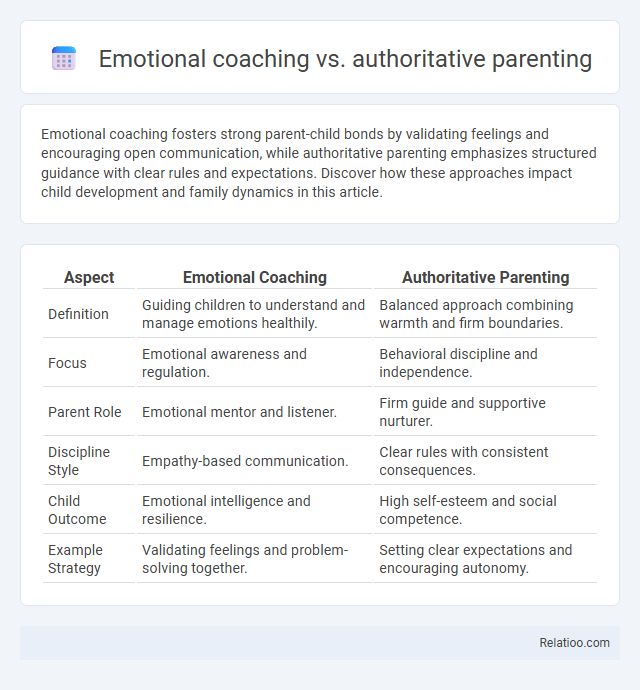Emotional coaching fosters strong parent-child bonds by validating feelings and encouraging open communication, while authoritative parenting emphasizes structured guidance with clear rules and expectations. Discover how these approaches impact child development and family dynamics in this article.
Table of Comparison
| Aspect | Emotional Coaching | Authoritative Parenting |
|---|---|---|
| Definition | Guiding children to understand and manage emotions healthily. | Balanced approach combining warmth and firm boundaries. |
| Focus | Emotional awareness and regulation. | Behavioral discipline and independence. |
| Parent Role | Emotional mentor and listener. | Firm guide and supportive nurturer. |
| Discipline Style | Empathy-based communication. | Clear rules with consistent consequences. |
| Child Outcome | Emotional intelligence and resilience. | High self-esteem and social competence. |
| Example Strategy | Validating feelings and problem-solving together. | Setting clear expectations and encouraging autonomy. |
Understanding Emotional Coaching
Emotional coaching emphasizes recognizing and validating a child's feelings to foster emotional intelligence, contrasting with authoritative parenting, which combines firm discipline with responsiveness. Understanding emotional coaching involves guiding children to navigate emotions constructively, promoting empathy and self-regulation skills. Unlike authoritarian methods, emotional coaching supports open communication and resilience development.
Key Principles of Authoritative Parenting
Authoritative parenting emphasizes a balanced approach combining high responsiveness and clear, consistent expectations, fostering secure attachment and emotional regulation in children. Key principles include setting age-appropriate boundaries, encouraging open communication, and providing warmth alongside firm guidance. This style supports the development of autonomy and social competence by promoting emotional understanding and responsible decision-making.
Comparing Emotional Coaching and Authoritative Parenting
Emotional coaching emphasizes recognizing and validating a child's emotions to promote self-regulation and empathy, while authoritative parenting combines warmth and firm boundaries to foster independence and social competence. Unlike authoritative parenting, which enforces rules with clear expectations, emotional coaching prioritizes emotional awareness as a tool for behavior guidance. Research shows that integrating emotional coaching within an authoritative framework enhances children's emotional intelligence and overall psychological resilience.
Emotional Intelligence Development in Children
Emotional coaching fosters emotional intelligence development by helping children recognize, understand, and manage their feelings through empathetic guidance, unlike authoritative parenting which balances strict rules with warmth but may limit open emotional expression. You enhance your child's emotional growth by validating their emotions and teaching problem-solving skills, key components of emotional coaching that promote self-awareness and resilience. Prioritizing emotional coaching over authoritative or permissive approaches cultivates better emotional regulation, social skills, and long-term mental well-being in children.
Communication Strategies in Both Approaches
Emotional coaching emphasizes empathetic communication, encouraging parents to validate their child's feelings and guide them through emotional understanding, fostering self-awareness and emotional intelligence. Authoritative parenting balances clear, consistent rules with open dialogue, promoting a respectful exchange that supports both behavioral expectations and emotional connection. Your choice between these approaches shapes how effectively you use communication strategies to nurture your child's emotional growth and discipline.
Discipline Techniques: Guidance vs. Control
Emotional coaching discipline techniques emphasize guidance by helping Your child recognize and regulate emotions, fostering self-awareness and problem-solving skills. Authoritative parenting balances guidance with clear, consistent rules, promoting autonomy while maintaining appropriate control and setting limits. Emotional coaching avoids control-based methods, focusing instead on empathy to encourage intrinsic motivation and long-term emotional resilience.
Impact on Parent-Child Relationship
Emotional coaching enhances the parent-child relationship by fostering open communication, empathy, and emotional regulation skills, creating a secure and trusting bond. Authoritative parenting combines high responsiveness with clear boundaries, promoting mutual respect and independence while maintaining emotional support. In contrast, purely authoritarian approaches may hinder emotional connection, potentially leading to increased conflict and reduced trust within the relationship.
Long-Term Effects on Child Behavior
Emotional coaching promotes self-regulation and empathy, resulting in better long-term emotional intelligence and social skills for your child. Authoritative parenting, characterized by balanced discipline and responsiveness, fosters independence and responsible behavior, enhancing academic success and social competence. Emotional coaching paired with authoritative strategies offers the most effective approach for positive behavioral outcomes and mental well-being in the long run.
Cultural and Societal Influences
Emotional coaching emphasizes recognizing and validating children's feelings, which aligns well with collectivist cultures valuing emotional interdependence and social harmony, whereas authoritative parenting blends warmth with clear expectations, commonly found in Western societies prioritizing individual autonomy and personal responsibility. Cultural norms heavily influence the effectiveness and acceptance of these parenting styles, with emotional coaching fostering emotional intelligence in diverse cultural settings, while authoritative parenting may face challenges in societies where hierarchical family structures are dominant. Societal factors, such as education systems and community support networks, further shape how parents implement emotional coaching or authoritative approaches, affecting children's social and emotional development outcomes worldwide.
Choosing the Right Approach for Your Family
Emotional coaching fosters open communication and empathy by validating children's feelings, promoting healthy emotional development and resilience. Authoritative parenting combines clear boundaries with warmth and support, encouraging independence while maintaining discipline. Choosing the right approach for your family depends on balancing emotional guidance with consistent structure to meet your child's unique needs and personality.

Infographic: Emotional coaching vs Authoritative parenting
 relatioo.com
relatioo.com